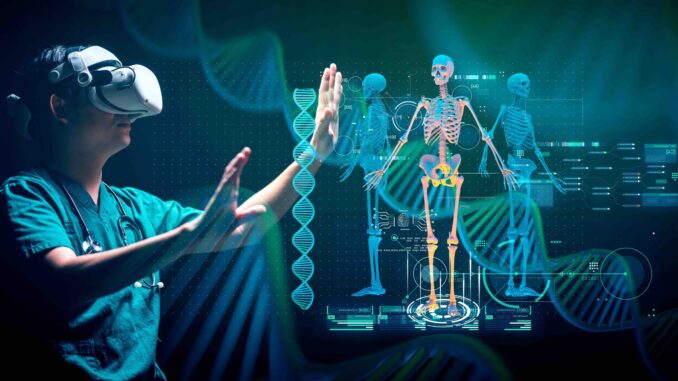
While Metaverse is progressing, it holds good potential in healthcare that blends the technologies like intelligent cloud, Augmented Reality, Web 3.0, Virtual Reality, Internet of Medical Devices, Artificial Intelligence, quantum computing, and edge as well as with robotics to offer new directions to healthcare. Increase utilization of VR in medical training is there. VR is getting used by experts and doctors to train fellow medical staff and doctors, wherein VR could be leveraged to take a learner within the human body and to replicate methods that are applied in the real world or do offer 3600 views of a patient’s ailment.
Metaverse is not an easier concept to learn, bringing together everything and everyone in the Globe into one single networked VR. It’s also tricky to talk about healthcare as it seems so futuristic. But when you think about how connected devices are so far changing our lives, it is easy to understand why this idea of all things being linked has captured the imagination.
Table of Contents
Latest medical association study how metaverse would change the healthcare
Metaverse is a new process to meaningfully utilize patients’ healthcare information. In technological evolution, its importance and emergence had already been predicted.
Metaverse is defined as interaction with digitized patient details utilizing sensors as a medium. Just like humans upload their photos and comments on social media and share their daily lifestyle, in the future, long-lasting data of patients will be acknowledged through their hospital visits.
The metaverse would pose certain distinctive challenges to the healthcare industry. One unique obstacle will be certain that patients’ confidential details, shielding them under HIPAA, is secure and safe. Developing a healthcare chapter in the metaverse to make certain that all patient data is secured could potentially be one manner to provide privacy and safety.
Healthcare providers would also be challenged in how to do the telehealth experience that involves digital therapeutics, consultations, and remote exams even better than an in-person experience.
How metaverse does play a part in the reshaping healthcare
The health industry has now begun utilizing components such as artificial intelligence (AI), augmented reality (AR), and virtual reality (VR) in hardware and software to intensify the capability of medical devices and enlarge the reach of medical care, as per a report. Plainly put, the metaverse will be an extension of the mixed reality (MR), VR, and AR technologies that we apply today.
The virtual universe or metaverse is a set of joined spaces online where one can take part in activities such as shopping, gaming, and even address events through virtual avatars. It is an amalgamation of various technologies like digital currencies, AI, MR, AR, and VR.
Potentials of Metaverse in Healthcare
The idea of Metaverse has unbelievable potential, offering a completely new approach to human connection and interaction. The latest change of FB name to Meta is evidence of the organization’s vision and far-sightedness that Metaverse will design up the Internet in the coming years.
The fact is that FB has invested in augmented and virtual reality for years and has been shaping new manners to construct interactive platforms, and even before changing out its name, the organization indicated its direction towards this technology through its asset of VR Company Oculus.
The Next Frontier For Healthcare: The Metaverse, Augmented Reality, and Virtual Reality
Organizations would have to address how this technology will be developed in a manner that is not only secure for the patient but does serve a humanistic aspect of medicine. After all, healthcare is not just about giving treatment to the symptoms—but plus, is also about treating the human.
Metaverse will Shape the Clinical Experience in Healthcare
The metaverse will at a slow pace change the manner counselors, sleep doctors, medical pain specialists, therapists, psychiatrists interact with their patients. I am pretty certain that some person with diabetes will have their real blood glucose and heart rate measured out by the Fitbit-like equipment being well worn in real lives, will show up beside their virtual character in a medical room. This will be a pretty absorbing manner of patient interaction. Eventually, we all will be getting used to it. Just like our family got used to utilizing uber and Facebook.
Is the future of healthcare in the metaverse?
Metaverse brings back worldwide healthcare professionals together for concurrent planning, education, and training along with collective medical procedures. As per the company website, it uses real-time communication and advanced cloud technology to permit clinicians to practice their skill with utmost precision to make sure everyone gets a good healthcare delivery anywhere and anytime.
Whether this will answer in healthcare meet up the metaverse remains to be seen. However, anyone who has utilized a digital avatar at a virtual event or work meeting has already had an essence of what the future might hold. And we all have already seen the formation of metaverse platforms geared towards healthcare space.
FB and Microsoft glasses such as HoloLens and Oculus already are being utilized in medical technology applications, from surgical procedures to design of medical tools.
In the metaverse, the visit will be completely virtual. An avatar will interact with the doctor just like it occurs during a face-to-face, classical appointment. But this is not a mirage of personal contact. A digital person in the metaverse will not be only a computer-simulated 3D photo of someone’s behavior and looks, but an accurate, data-based projection of this human.
The metaverse will ease some advancements. Foremost, a doctor, visible in 3D, will scrutinize us, having way into all data. To examine the patient will shift to examine the data. For lesser complex disorders, the doctor will be an algorithm understanding millions of patients better than some actual doctor working in the tiny local community.

Leave a Reply